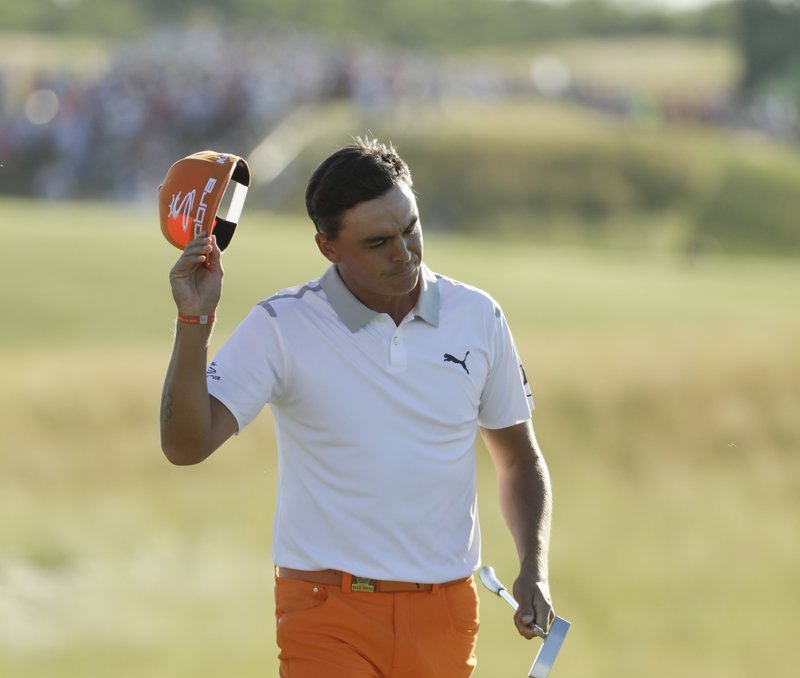Bummer buddies: Roomies Fowler, Thomas fizzle at US Open

Rickie Fowler on the 18th hole during the fourth round of the U.S. Open golf tournament Sunday, June 18, 2017, at Erin Hills in Erin, Wis. (AP Photo/David J. Phillip)
ERIN, Wis. — Rickie Fowler was hoping to wipe away the past. Justin Thomas was hoping to relive it.
Neither got what they were looking for Sunday at the U.S. Open.
Article continues after this advertisementThe buddies who shared a house near Erin Hills also shared the misery during a wind-swept final round in which they never got themselves into the mix.
As was the case in previous majors where he’s contended, Fowler did little to put real pressure on the leaders.
Thomas, looking for more from where his record-setting 63 came from the day before, was out of the hunt by the middle of the front nine.
Article continues after this advertisement“Well, it wasn’t going to be like yesterday, regardless,” Thomas said, acknowledging that record-setting days don’t come around all that often.
Fowler gave himself a break: “You kind of have to say, ‘Hey, it’s a major, I played well this week.’”
Fowler shot even-par 72 to finish at 10 under. That score would have won all but two of the previous 116 renditions of this championship. But rain-softened Erin Hills was a new U.S. Open course and a much different creature than most of the previous hosts. Fowler’s 10 under was only good for a fifth-place tie.
Thomas bogeyed three of the first five holes and tied for ninth at 8 under, eight shots out of the lead.
The two Americans, the closest thing to household names and/or favorites on a third-round leaderboard full of players looking for their first major, were left to tip their hat to countryman Brooks Koepka, who played close-to-flawless golf and tied the U.S. Open record in relation to par at 16 under.
“It made me feel a lot better seeing Brooks shoot 5 under,” Thomas said. “I would have had to play some pretty spectacular golf to catch him.”
He was spectacular Saturday, never more than when he hit a 3-wood from 300 yards to 8 feet on No. 18 for an eagle putt that he drained to record the 31st score of 63 in major history. His 9 under was the best-ever U.S. Open score in relation to par.
That put him in Sunday’s final pairing — a 2:54 p.m. tee time — and Thomas, an early bird, said it was “bizarre for me,” hanging around the house he shared with Fowler, trying to avoid the phone, the TV, all that was being written and said about him until it was time to go to the course.
Once he got there, he never got comfortable.
He hit a good putt on No. 2 that got caught the left edge of the cup and spun out, and settled for bogey. A chip on the fourth almost went in, but then trickled back to 4 feet and he blocked the par putt to the right.
“Obviously, that’s just one shot, but that was a pretty big turn,” Thomas said of the bogey on No. 4. “It went from (maybe) a good save and a tap-in par to now going 2 over through four and really behind the eight ball.”
After his 68 on Saturday put him in contention yet again at a major, Fowler said he was looking forward to what was supposed to be a windier, tougher day at Erin Hills. But he said the wind wreaked havoc with his putts, blowing them off line and putting him in spots where “getting kind of the right gust at the right time was kind of key.”
Fowler needed 30 putts on Sunday, compared to 24 on Saturday. When he pushed a 30-foot birdie try on No. 12 a full 12 feet past the hole, he set himself up for bogey. It put him at 10 under, three out of the lead, and Fowler never got closer.
It added another less-than-fantastic finish for Fowler at the majors.
He was two back of Jordan Spieth and Bubba Watson heading into the last round at the 2014 Masters but shot 73 and never threatened. He had chances at the British Open and PGA that year, as well, but his play got overshadowed by others. (Sergio Garcia and Phil Mickelson made more memorable runs at Rory McIlroy at those events.). At this year’s Masters, he entered the final round trailing by one but shot a 76 and was far from the drama between Garcia and Justin Rose.
A disturbing trend, or just a rough day on the golf course?
“If you look at the negatives too much, you’re going to be stuck doing that the whole time,” Fowler said. “You have to measure success in different ways, not just by winning, just because that doesn’t happen a whole lot.”